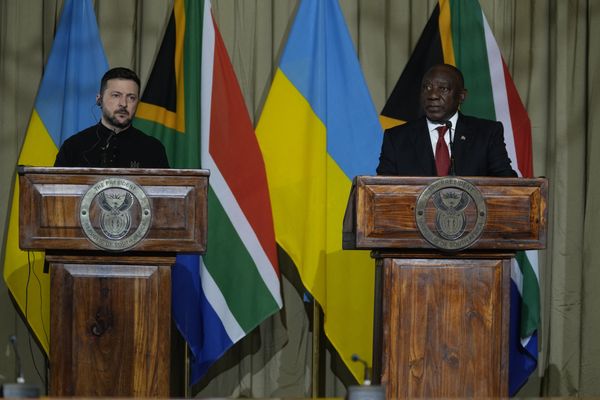
One of the saddest comments since Saturday’s referendum was from the Wangkangurru elder Don Rowlands from near Birdsville in the Queensland electorate of Maranoa, where 85% voted no.
“Maybe I don’t have as many friends as I thought. All I can do now is take flour and water and make a damper. It’s no help to my colleagues around the country,” Rowlands said.
I also retreated to make bread and think about what it meant. I still don’t know, but this is what I saw.
I live in the southern New South Wales electorate of Riverina, held by the former National party leader Michael McCormack. Ours is a small town on Wiradjuri country, where 20% of local public primary school kids identified as having Aboriginal heritage, according to a 2022 report. In the 2021 census, 8.7% of the town identified as being Aboriginal or Torres Strait Islander. Nationally the Indigenous population is about 3%.
Riverina voted 75% no.
I arrived in this place just after the Mabo debate. It was 1996 and Pauline Hanson was coming to parliament – the first time around.
I heard the myths back then about Indigenous people getting more than the rest of us, and I still hear them. I heard all the residual fears about land grabs: first post-Mabo, again during the Wik debate, and again in the lead-up to Saturday’s referendum. It was the same old stuff, piled higher with extra grievances such as the need for a Welcome to Country “in your own country”.
This time, there was a new catch-22. I heard that Aboriginal people had not pulled themselves up by their bootstraps and yet, somehow, they were simultaneously too successful. Senator Jacinta Nampijinpa Price’s inaccurate description of the minister for Indigenous Australians, Wiradjuri woman Linda Burney, as “dripping with Gucci” was heard more than once.
I learned long ago that there is no point yelling at people who disagree with you, particularly when you might see them in the frozen food aisle. Unlike cities, social hierarchies and partisan voters do not have postcodes in the country.
That can be a plus, but it can also mean you just don’t talk about politics. This democratic exercise felt like another Great Silence, separate but related to the one described by WEH Stanner in his 1968 Boyer lectures on the cult of forgetfulness regarding the frontier wars.
For all the shouting at the federal level, the silence in my town streets was deafening in this campaign. People were loath to talk about the referendum and its implications, much less discuss how they would vote, unless they were confident they were in company who may reflect their own opinions.
And while avoiding the discussion kept people on safer social territory, it ensured that no one was exposed to views they might not agree with.
In spite of this strange silence, in the final week, someone sidled up to me in a shop. They couldn’t understand why there was such opposition to what seemed like a reasonable proposition. They stopped talking as other people walked past. There was a reticence to be known on either side of the campaign.
On the same day, another person asked me to explain the voice proposal in “normal language”. They were confused by the competing messages but leaning towards a yes vote.
When I attended the local Mechanics’ Institute hall to vote on Saturday, there was one volunteer out front holding a yes sign. He was gone by the time I walked out.
There was no one representing the no case, probably because anyone who knew the place knew it was not necessary. I was offered a pen, in case I didn’t trust the process. I declined and voted in pencil.
By 7.30 on Saturday night, the voice was defeated.
As I threw loaf after loaf at the kitchen bench, I recalled a speech by the Labor senator and Yawuru man Pat Dodson, the so-called father of reconciliation.
Back in 2014, the then Abbott government tried to change the Racial Discrimination Act to remove the provisions that make it an offence to “offend, insult and humiliate”, while introducing an offence of “vilification” on the grounds of race.
Tony Abbott wanted to “maintain the red light for bigotry but remove the amber light for free speech”.
The two largest Liberal state governments at the time, NSW and Victoria, opposed the changes. Multicultural communities began a grassroots campaign directed to local councils to pass a motion calling on the government to drop the proposal.
But the debate dragged on and in 2016, Dodson rose to speak.
“Racism is something that isn’t growing wild out there in the fields, it’s actually tendered in a flower box sitting on the window sills of flats and houses,” Dodson said.
He said something that struck home with me, as a migrant kid born in the 60s.
“We don’t debate the definition of whiteness or the culture of whiteness and nor should we,” he said.
“But there is something we need to pull ourselves up on and that is the age-old reality of what it’s like to walk in the shoes of someone else who is different, diverse and has a richness of their own culture, when we talk about them, when we write about them and when we print things in relation to them.”
It is clear racism was at play in this debate. It was around me, but it wasn’t only in the bush. We will never know how big a part it played, compared with cost of living and general confusion over the concept.
But it is not beyond belief that a referendum forcing people to confront and listen to Indigenous disadvantage and history stuck in the craw of many voters who would prefer to look away.







